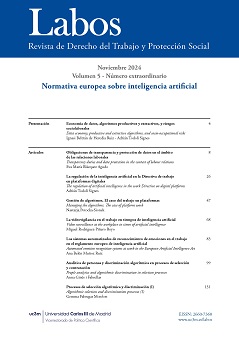The regulation of artificial intelligence in the work Directive on digital platforms
Abstract
The recently approved Digital Platform Work Directive consists of two well-differentiated parts. On one hand, it establishes a presumption of employment for all digital platform workers. On the other hand, it sets forth both individual and collective safeguards for workers and self-employed individuals against algorithmic management (or the use of Artificial Intelligence in the workplace). The purpose of this paper is to analyze the second part of the Directive: the protections against the use of artificial intelligence to manage and control work as outlined in the Directive. To this end, the scope of the Directive is first examined, as the concept of “digital platform” requires interpretation to determine which platforms fall under its provisions. Secondly, regarding the safeguards against algorithmic management, the paper explores their relationship with pre-existing protections, such as the GDPR, as well as the scope, content, and interpretative challenges posed by the new regulation. Finally, based on the analysis and the interpretative issues identified, a series of recommendations for its transposition are presented.
Downloads
Copyright (c) 2024 LABOS Revista de Derecho del Trabajo y Protección Social

This work is licensed under a Creative Commons Attribution-NonCommercial-NoDerivatives 4.0 International License.
Loa autores ceden a la Revista Labos los derechos de reproducción y distribución, así como cualquier forma de explotación del trabajo.
Funding data
-
Ministerio de Ciencia e Innovación
Grant numbers PID2022-139967NB-I00




